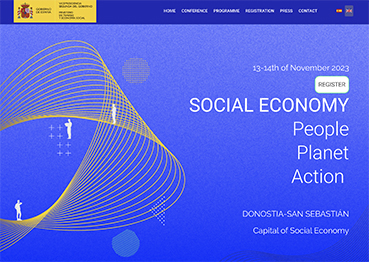On 13 and 14 November, San Sebastian is preparing to host the ‘European Social Economy Conference: People, Planet, Action‘, organised by the Spanish Ministry of Labour and Social Economy within the framework of the Spanish Presidency of the Council of the European Union. The conference will bring together governments, European institutions, OECD, ILO, CIRIEC and heads of social economy enterprises from all over the world.
The aim of the event is to highlight and render visible the socio-economic weight of this enterprise model throughout the world, and to debate the development of the latest important resolutions on the social economy adopted at international level, including the UN Resolution on the Social Economy for sustainable development, and the EU Council Recommendation for the establishment of framework conditions for the social economy in the 27 EU countries.
The event will begin on 13 November at the Kursaal Conference Centre in Donostia – Spanish Social Economy Capital 2023 – with a high-level political opening ceremony and the plenary session ‘European Action Plan and United Nations Resolution: a tool box to scale-up the Social Economy’. The plenary session will be moderated by the Special Commissioner for the Social Economy, Víctor Meseguer, and will be addressed by the European Commissioner for Employment and Social Rights, Nicolas Schmit; the President of the Basque Social Economy and of the Confederation of Basque Cooperatives-KONFEKOOP, Rosa Lavín, and the Deputy Director General for Employment and Social Protection (ILO), Mia Seppo, among others.
In addition, five workshops will be held simultaneously on the morning of the 13th, dealing with the social economy from different perspectives: the transformation for the future of the social economy; the green and digital transition; innovation, financing and access to markets; youth and the social economy; visibility and communication.
Visits to Basque social economy enterprises and organisations
Afterwards, visits will be made to different social economy enterprises and organisations: the Basque Culinary Center (BCC); GUREAK, an inclusive enterprise model that is a reference in Europe; GRINDEL, specialists in precision gears; Hotel ILUNION in San Sebastian; IDEKO/DANOBAT, a cooperative centre for construction and advanced manufacturing; IKERLAN, a cooperative research and development centre; KATEALEGAIA, a group made up of 12 labour enterprises, and LEINN, Mondragon University’s degree for innovative entrepreneurship.
The day will end with the Denon Artean Basque Co-operative Awards, organised by the Higher Council of Co-operatives of the Basque Country, which are awarded every two years in recognition of the work of individuals and institutions in favour of the co-operative enterprise model. In this third edition, recognition of Basque co-operativism will go to the European Commission.
San Sebastian Declaration
The following day, 14 November, the President of SEE and CEPES, Juan Antonio Pedreño, together with the Secretary of State for Employment, Joaquín Pérez Rey, the President of Mondragón Corporación, Iñigo Ucín, and the 2nd Vice-President of the Basque Government, Idoia Mendia, among other authorities, will take part in the plenary session ‘Europe needs the Social Economy’, moderated by the Director General for Self-Employment, Social Economy and CSR, Maravillas Espín.
The Summit will end with the ‘San Sebastian Declaration’, which will be presented at the closing Ceremony, with the participation of the Second Vice-President of the Spanish Government and Minister of Employment and Social Economy, Yolanda Diaz, together with senior officials from the governments of Luxembourg, France, Romania, Germany, Portugal and Belgium. All these countries are leading examples with advanced policies for this enterprise model.
Presentation of the second European Social Economy Awards
The second edition of the ‘Social Academy Awards’ will also be held on the 14th. These awards are given every two years by Social Economy Europe to recognise innovative enterprise experiences at the technological, social and environmental levels







